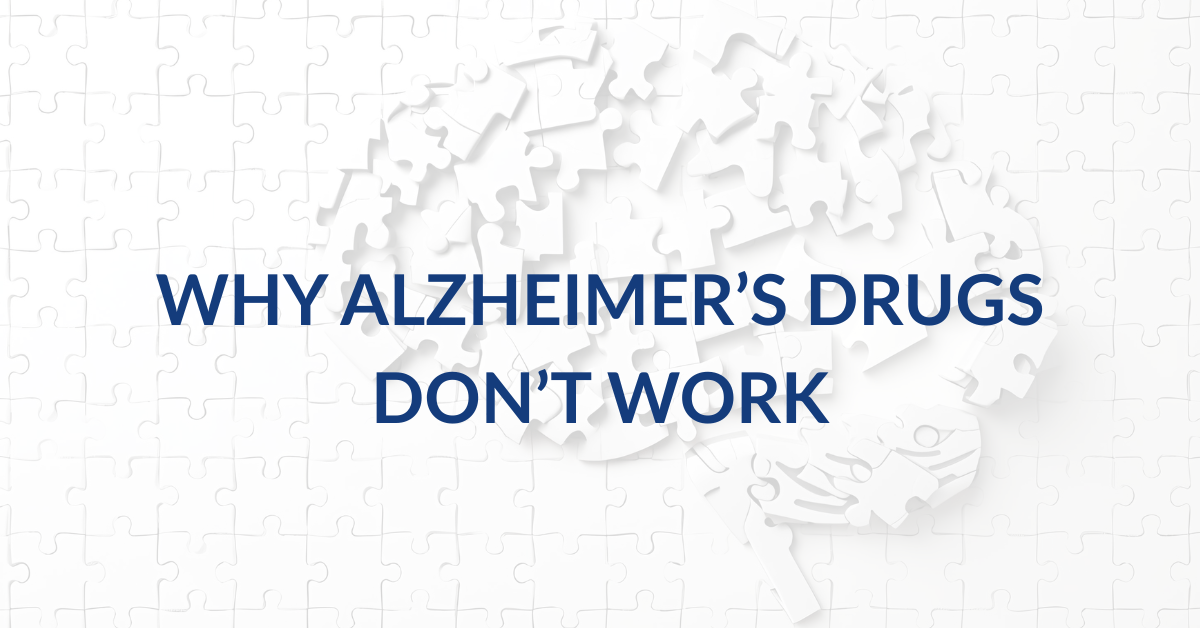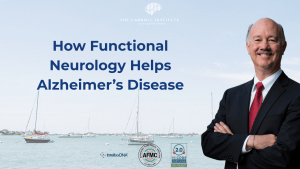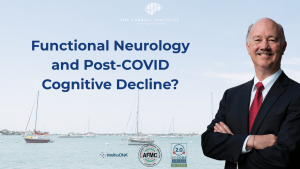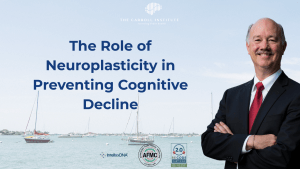Why Alzheimer's Medications Don't Work (And What Does)
Families spend thousands of dollars on Alzheimer’s medications like Aricept, Namenda, and Exelon, hoping for improvement. The reality is harsh: these drugs provide minimal benefit and cannot reverse cognitive decline. At The Carroll Institute, we explain why pharmaceutical approaches fail and what actually works to restore memory and cognitive function.
As the only ReCODE certified functional neurology clinic in Sarasota, we’ve helped hundreds of families achieve what medications cannot – actual cognitive improvement through root cause treatment.
The Pharmaceutical Failure: By the Numbers
Clinical trial data reveals the stark truth about Alzheimer’s medications.
Cholinesterase Inhibitors:
Donepezil (Aricept):
- Provides 2-3 point improvement on cognitive tests
- Benefits last only 6-12 months in most patients
- 40% of patients experience no benefit at all
- Side effects include nausea, diarrhea, and sleep problems
Galantamine (Razadyne):
- Similar minimal benefits to other cholinesterase inhibitors
- May cause nausea, vomiting, and weight loss
- No evidence of disease reversal or meaningful improvement
- Benefits are temporary and barely perceptible to families
Rivastigmine (Exelon):
- High rate of gastrointestinal side effects
- Many patients cannot tolerate the medication
- No long-term cognitive protection
- Slows decline imperceptibly without reversing damage
NMDA Receptor Antagonist
Memantine (Namenda):
- Minimal cognitive improvement in clinical trials
- May slow decline slightly in moderate cases but does not reverse it
- No effect on disease progression or underlying causes
- Common side effects include dizziness and confusion
Newer Amyloid-Targeting Drugs
Lecanemab (Leqembi):
- FDA approved despite showing only minimal slowing of decline
- 27% reduction in cognitive decline rate – not reversal
- Costs $26,500 annually with barely perceptible benefits to families
- Brain swelling and bleeding in significant percentage of patients
- Does not reverse Alzheimer’s or restore lost cognitive function
Donanemab (Kisunla):
- Recently approved with similar limited benefits to Leqembi
- Slows decline by approximately 35% – still no reversal
- Requires regular brain monitoring for dangerous side effects
- Costs tens of thousands annually for imperceptible improvement
- Cannot restore memory or reverse existing brain damage
Aducanumab (Aduhelm):
- FDA approval despite questionable efficacy
- Costs $56,000 annually with no meaningful benefit
- Brain swelling in 35% of patients
- No cognitive improvement or disease reversal demonstrated
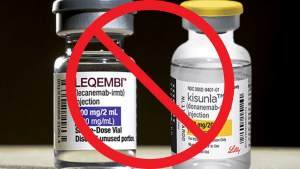
Why These Medications will never Work
Fundamental Limitation:
No Alzheimer’s medication – including the newest drugs like Leqembi and Kisunla – can reverse dementia or restore lost cognitive function. At best, they may slow decline by a barely perceptible amount that families often cannot detect in daily life.
Single-Target Approach:
Medications focus on one brain pathway (acetylcholine or amyloid plaques). Cognitive decline involves dozens of factors working simultaneously. Targeting one pathway while ignoring others cannot produce meaningful improvement or reversal.
Symptom Management Philosophy
Pharmaceutical companies design drugs to manage symptoms or slow progression rather than eliminate underlying causes. Even the newest “breakthrough” drugs only claim to slow decline – never to reverse it.
Late-Stage Intervention:
Most patients receive medications after significant brain damage has occurred. Drugs cannot repair dead brain cells, restore lost neural connections, or reverse existing cognitive impairment.
Ignoring Root Causes
No medication addresses the toxins, infections, hormonal imbalances, and metabolic dysfunction that destroy brain cells. The underlying damage continues while patients take expensive drugs that provide imperceptible benefits.
The Root Cause Reality
Chronic Inflammation:
Persistent brain inflammation destroys memory centers and prevents new neural connections. Anti-inflammatory medications provide minimal brain protection.


Heavy Metal Toxicity:
Arsenic, mercury, and lead accumulate in brain tissue, causing inflammation and cell death. No medication removes these toxins from the brain.
Mold and Mycotoxin Exposure:
Toxic mold produces chemicals that cross the blood-brain barrier and destroy neural tissue. Pharmaceutical drugs cannot eliminate these neurotoxins.


Hormonal Imbalances:
Declining thyroid, sex hormones, and insulin resistance accelerate cognitive decline. Standard hormone replacement often uses synthetic hormones that don’t optimize brain function.
Metabolic Dysfunction:
Blood sugar problems and decreased cellular energy production starve brain cells. Diabetes medications don’t address the complex metabolic issues affecting brain health.


Decreased Brain Blood Flow:
Poor circulation reduces oxygen and nutrient delivery to brain tissue reducing energy production. Cardiovascular medications may help circulation but don’t specifically optimize brain perfusion.
What Actually Works: The ReCODE Protocol
Real cognitive improvement requires systematic root cause elimination
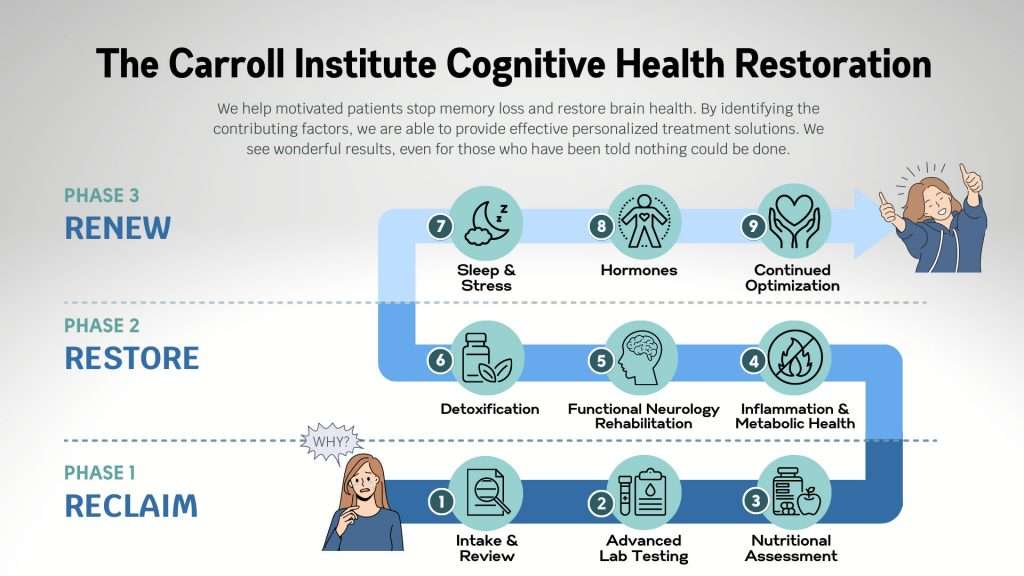
Comprehensive Testing:
Advanced laboratory analysis identifies each patient’s specific combination of root causes. Standard medical tests miss most of these factors.
Personalized Treatment:
Custom protocols target individual root causes rather than using one-size-fits-all approaches. Every patient receives different treatments based on their unique test results.
Toxin Elimination:
Specialized detoxification protocols safely remove heavy metals, mold toxins, and other neurotoxins from brain tissue. This cannot be achieved with medications.
Inflammation Reduction:
Natural anti-inflammatory approaches specifically target brain inflammation while supporting overall health. Pharmaceutical anti-inflammatories often have significant side effects.
Metabolic Optimization:
Blood sugar regulation, hormone optimization, and cellular energy restoration provide the foundation for brain healing. This requires functional medicine approaches, not standard medications.
Neurological Rehabilitation:
Custom cognitive exercises rebuild damaged neural pathways. The Carroll Institute is the only clinic in Sarasota creating personalized cognitive rehabilitation based on individual brain dysfunction patterns.
What if we told you Alzheimer’s could be REVERSED, not just managed?
Documented Results vs. Medication Outcomes
ReCODE Protocol Results:
- Average MoCA score improvement of 4.4+ points
- Patients return to work and independent living
- Families avoid nursing home placement
- Long-term cognitive stability maintained
Medication Results:
- 2-3 point decline at best, many are far worse
- Benefits fade within 6-12 months
- Progressive decline continues
- No restoration of lost function
Our 84% success rate demonstrates what’s possible with proper treatment.
The difference is dramatic: we achieve cognitive improvement while medications provide minimal temporary benefits.
The Cost of Ineffective Treatment
Families waste valuable time and money on medications that will never work:
Financial Costs:
- Alzheimer’s medications cost $3,000-$56,000 annually
- Insurance copays and deductibles add additional expense
- No return on investment with minimal benefits
Opportunity Costs:
- Time spent on ineffective treatment delays proper intervention
- Early intervention with root cause treatment produces better results
- Months or years of continued decline while taking medications
Emotional Costs:
- False hope followed by disappointment
- Family stress from watching continued decline
- Guilt about not finding effective treatment sooner
Why Doctors Continue Prescribing Ineffective Medications
Several factors perpetuate the use of failed pharmaceutical approaches.
Medical Training:
Doctors learn to prescribe medications for symptoms. Medical schools don’t teach root cause analysis or functional medicine approaches.
Insurance Coverage:
Insurance covers medications but often doesn’t cover comprehensive testing or functional medicine treatments.
Pharmaceutical Marketing:
Drug companies spend billions promoting their products to doctors. Functional medicine approaches don’t have marketing budgets.
Time Constraints:
Writing prescriptions takes minutes. Comprehensive root cause analysis requires hours of evaluation and testing.
The Path Forward: Beyond Pharmaceutical Failure
Families don't have to accept medication failure as the only option. Don't waste precious time on treatments that cannot work.
If you’re considering medication treatment:
- Understand the limited benefits and significant costs
- Investigate root cause approaches first
- Seek evaluation from functional medicine specialists
- Make informed decisions based on actual success rates
If you’re currently taking Alzheimer’s medications:
- Evaluate whether you’re seeing meaningful improvement
- Consider comprehensive root cause testing
- Explore functional medicine alternatives
- Don’t stop medications without medical supervision
The Carroll Institute offers what medications cannot: proven cognitive improvement through systematic root cause elimination.
Tired of ineffective medications that don’t address the real causes of cognitive decline? Schedule a free discovery call to learn about our proven approach that achieves what pharmaceuticals cannot – actual cognitive improvement and memory restoration.
Your future doesn’t have to include cognitive decline. We’re here to show you what’s truly possible when you receive the right care.
Dr. Garland Glenn leads the only ReCODE certified functional neurology clinic in the Sarasota area, achieving an 84% success rate where medications fail. With over 40 years of functional neurology experience, he has helped hundreds of families move beyond pharmaceutical failure to achieve real cognitive improvement at The Carroll Institute.

Dr. Garland Glenn, DC, PhD, IFM, AFMC
Founder & Clinical Director, The Carroll Institute — Sarasota, FL
Dr. Garland Glenn is a board-certified chiropractic physician and functional medicine practitioner specializing in cognitive health, neurodegeneration, and root-cause medicine. Certified as an AFMC (Advanced Functional Medicine Clinician) and Institute for Functional Medicine (IFM) trained, he has also completed over 500 hours of advanced training in Functional Neurology under Dr. Ted Carrick, founder of the Carrick Institute.
At The Carroll Institute, Dr. Glenn leads Sarasota’s only ReCODE-certified Functional Neurology program, helping patients reverse or prevent cognitive decline through the Bredesen ReCODE Protocol, neuroplasticity exercises, and personalized functional medicine care.
Learn more about his background and approach at About Dr. Garland Glenn.
– schedule now –
free discovery call
To help you get started, we offer a free 20-minute Discovery Phone Consultation. During this call, you will be able to talk with one of our Certified Brain Health Coaches about what going on with you or your loved one and find out if we can help. Please review our FAQs prior to scheduling your free call. We look forward to talking with you soon and helping you Save Your Brain.
(yes, it’s totally free!)
ReCODE® is a registered program developed by Dr. Dale Bredesen and licensed through Apollo Health. Dr. Garland Glenn is a certified ReCODE practitioner.
